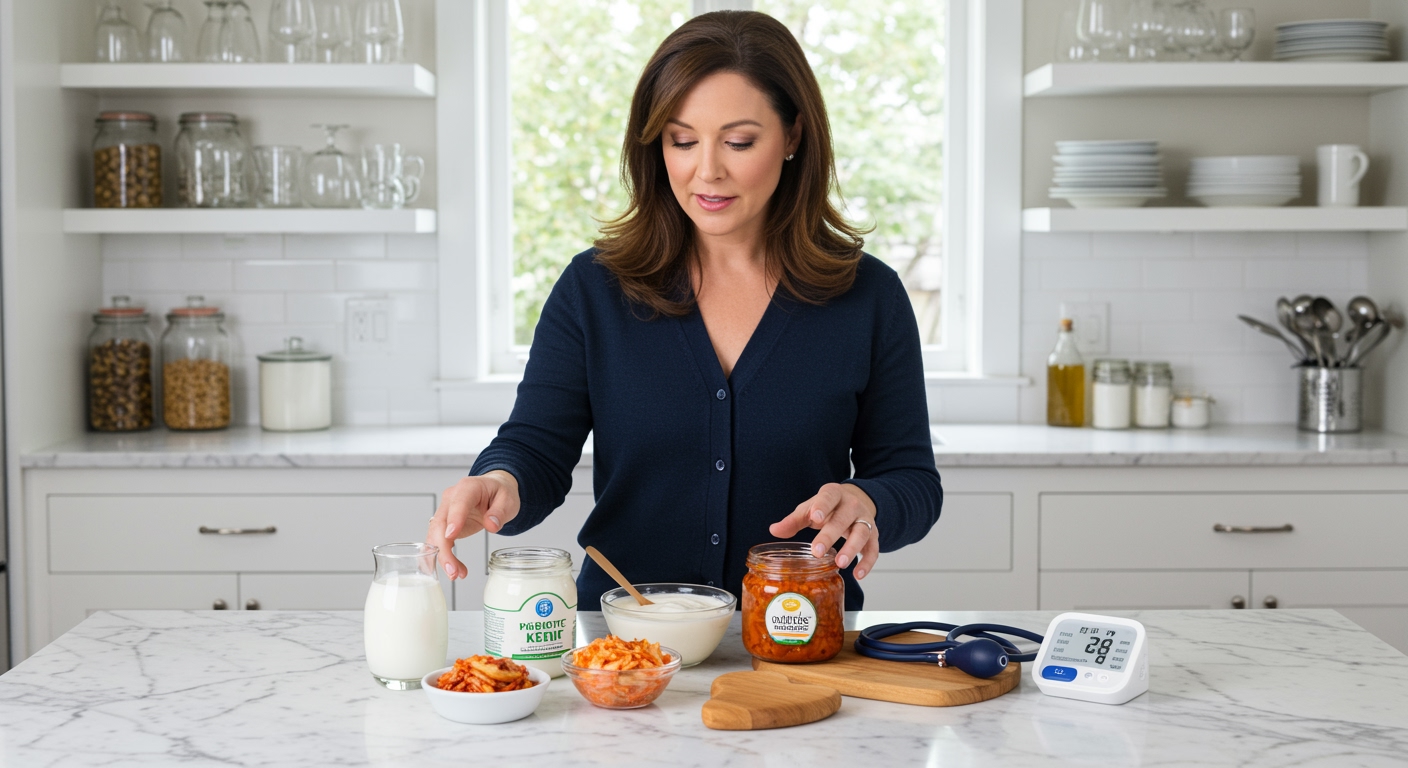✪ Key Takeaway: Probiotic foods can lower blood pressure, but people with existing low blood pressure should monitor levels carefully.
Introduction
Your morning yogurt might be doing more than just satisfying your taste buds.
You probably started eating probiotic foods for better digestion, but now you wonder if they could affect your blood pressure too.
Hi, I am Abdur, your nutrition coach and today I am going to explain how probiotic foods can influence your blood pressure levels and what this means for people with low blood pressure.
How Do Probiotics Actually Lower Blood Pressure?
The connection between your gut and blood pressure runs deeper than most people realize.
Beneficial bacteria in probiotic foods produce compounds that directly affect your cardiovascular system.
These tiny organisms create short-chain fatty acids during fermentation, which help relax blood vessel walls.
Research shows that specific probiotic strains can reduce both systolic and diastolic blood pressure by an average of 3-5 mmHg.
The mechanism involves the renin-angiotensin system, which controls blood pressure regulation in your body.
Probiotics also reduce inflammation markers that contribute to high blood pressure and improve overall vascular health.
✪ Fact: Lactobacillus plantarum and Bifidobacterium lactis show the strongest blood pressure lowering effects in clinical studies.
What Happens When Your Blood Pressure Is Already Low?
People with low blood pressure face a different challenge when consuming probiotic foods.
Your blood pressure might drop even further, leading to dizziness, fatigue, or fainting episodes.
Low blood pressure, or hypotension, occurs when readings consistently fall below 90/60 mmHg.
The same vasodilation effects that help people with high blood pressure can worsen symptoms in hypotensive individuals.
However, this does not mean you should avoid probiotic foods completely if you have low blood pressure.
The key lies in monitoring your response and adjusting your intake based on how your body reacts.
Some people with mild hypotension experience no additional blood pressure changes from moderate probiotic consumption.
✪ Pro Tip: Start with small amounts of probiotic foods and track your blood pressure readings for two weeks.
Which Probiotic Foods Have The Strongest Effect?
Not all probiotic foods create the same impact on your blood pressure levels.
Kefir contains the highest concentration of active probiotic strains, making it potentially the most potent option.
Fermented vegetables like sauerkraut and kimchi provide both probiotics and potassium, which supports healthy blood pressure.
Plain yogurt with live cultures offers moderate probiotic benefits without excessive sodium content found in some processed varieties.
Kombucha delivers probiotics along with antioxidants, but watch out for added sugars that might counteract benefits.
Miso and tempeh provide plant-based probiotics with additional protein and fiber for overall cardiovascular health.
The fermentation time and bacterial strains determine the potency of each food source.
✪ Note: Homemade fermented foods often contain more diverse bacterial strains than commercial products.
How Much Is Safe For Low Blood Pressure?
Finding the right amount of probiotic foods requires careful attention to your individual response.
Start with one small serving every other day rather than daily consumption when you have low blood pressure.
A small serving means about 2-3 tablespoons of yogurt or a quarter cup of fermented vegetables.
Monitor your blood pressure before and after eating probiotic foods for the first two weeks of introduction.
Pay attention to symptoms like increased dizziness, weakness, or brain fog after consuming these foods.
If you experience no negative effects, you can gradually increase to one small serving daily.
Never exceed two servings per day if you have diagnosed hypotension without medical supervision.
✪ Pro Tip: Consume probiotic foods with meals to minimize potential blood pressure fluctuations.
Should You Avoid Probiotics Completely With Hypotension?
Complete avoidance of probiotic foods might rob you of important health benefits.
Your digestive health and immune system still benefit from moderate probiotic intake, even with low blood pressure.
The key lies in choosing the right types and amounts rather than eliminating them entirely.
Focus on lower-potency options like plain yogurt instead of high-concentration kefir or supplements.
Consider timing your consumption when you can rest if you experience mild dizziness.
Some people find that eating probiotic foods with salty snacks helps counteract blood pressure drops.
Work with your healthcare provider to determine the safest approach for your specific blood pressure patterns.
✪ Fact: Most people with mild hypotension can safely consume small amounts of probiotic foods without significant issues.
The Bottom Line
Probiotic foods can indeed lower blood pressure, which means people with existing hypotension should approach them with caution.
Smart nutrition means understanding how foods affect your unique body, not following one-size-fits-all advice.
I would love to hear about your experience with probiotic foods and blood pressure in the comments below, so please share your thoughts or questions.
References
At NutritionCrown, we use quality and credible sources to ensure our content is accurate and trustworthy. Below are the sources referenced in creating this article:





